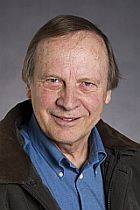Professor Bruce Bennett was born in Perth, Western Australia, in 1941. He was educated at West Leederville State School, Hale School and the University of Western Australia. A Rhodes Scholar, he is a graduate of the Universities of Western Australia, Oxford and London.
Professor Bennett taught at the University of Western Australia from 1968 to 1992, where he was Associate Professor and Director of the Centre for Studies in Australian Literature. He edited the quarterly literary magazine Westerly with Peter Cowan from 1975 to 1992, and, from 1993, was Professor of English at University College, University of New South
Wales at the Australian Defence Force Academy in Canberra.
Professor Bennett wrote and edited numerous books, articles and reports on Australian literature, culture and society. He held visiting appointments at universities in Asia, Europe and North America, served on the Australian National Commission for UNESCO from 1985 to 1990 and was a member of the Australia-India Council, with special interests in developing Australian studies courses in Indian universities.
Professor Bennett was made an Officer of the Order of Australia (AO) in 1993 for services to Australian literature and university education, was elected a Fellow of the Australian Academy of the Humanities in 1995 and was awarded a Doctor of Letters by published work at the University of New South Wales in 2004. He chaired the Modern Language Association of America's Division 33 (Literatures in English Other Than British and American) and was Vice-Chair of the Association of Commonwealth Literature and Language Studies. In November 2004, Professor Bennett was re-elected to the Council of the Australian Academy of the Humanities, where he served as general editor of publications.
In 2005, Professor Bennett took up an Overseas Fellowship at Churchill College, England. Later in that year he became the Group of Eight Chair at The Center for Australian and New Zealand Studies at Georgetown University, Washington DC, for the duration of the 2005-2006 academic year.
Professor Bennett co-edited the Oxford Literary History of Australia (1998), with Jennifer Strauss. His other major publications include Spirit in Exile: Peter Porter and his Poetry (1991), which won the Western Australian Premier's Award for Non-Fiction, An Australian Compass: Essays on Place and Direction in Australian Literature (1991) and Australian Short Fiction: A History (2002).
Professor Bennett was the inaugural chair of the AustLit Advisory Board.


